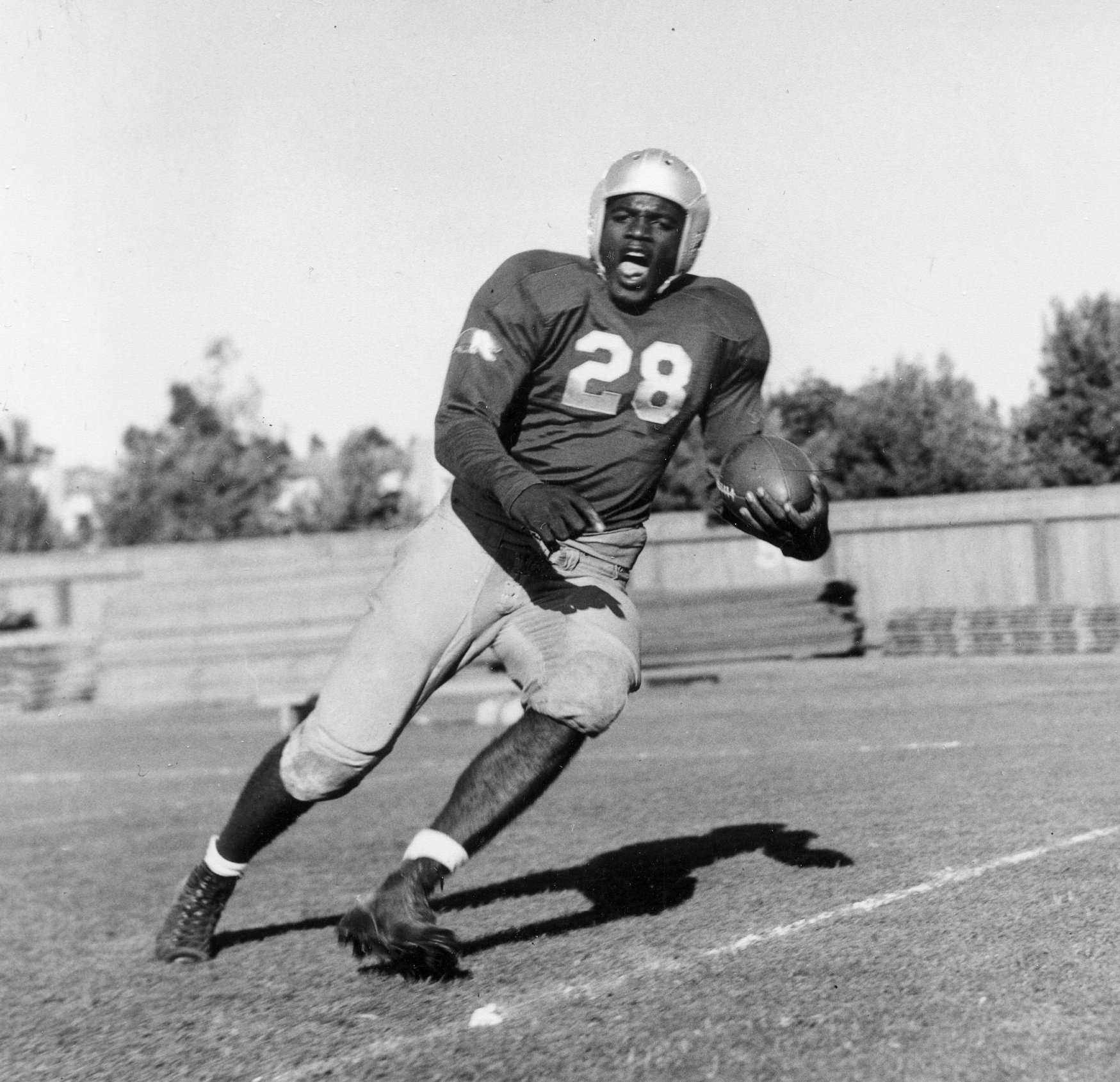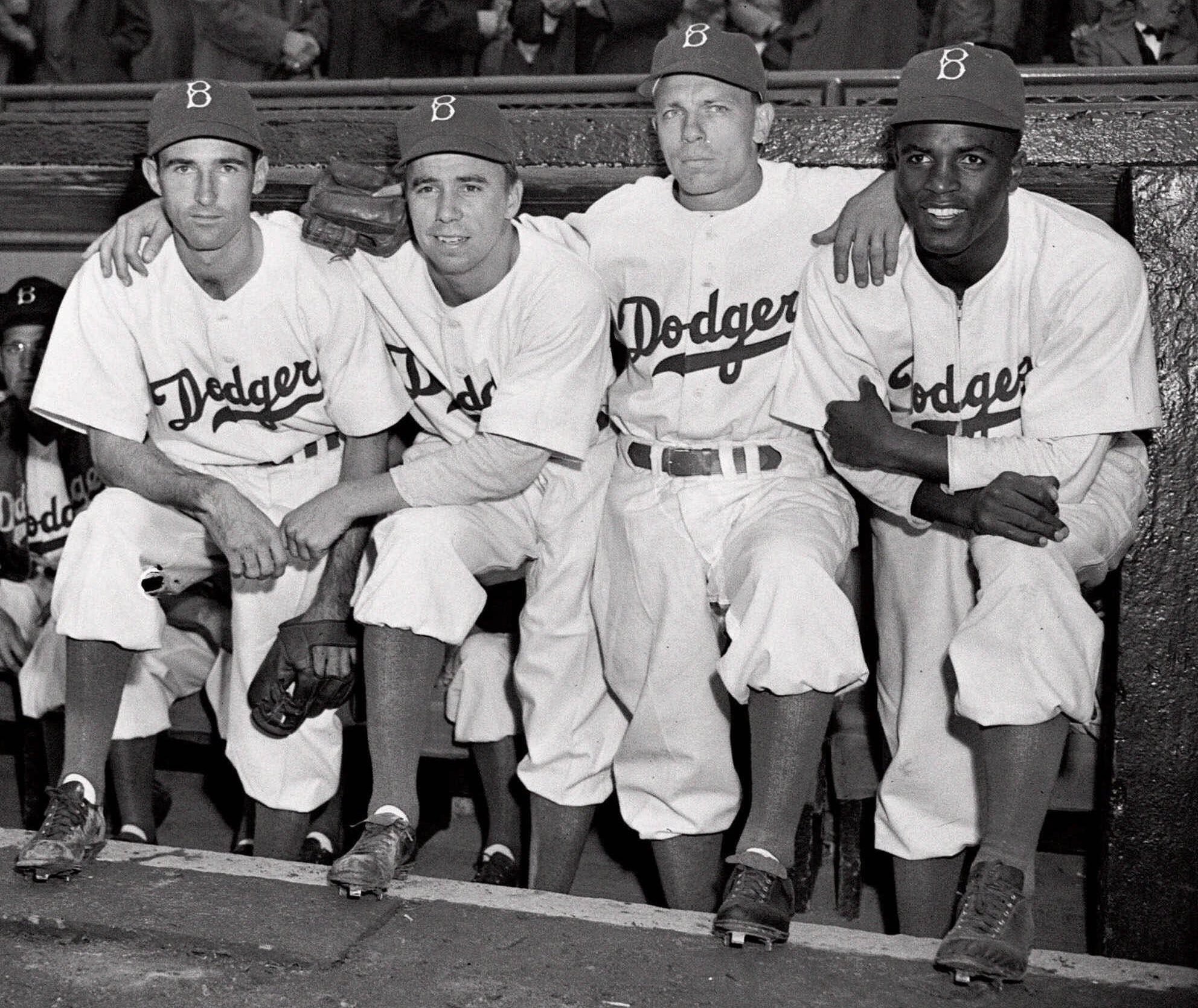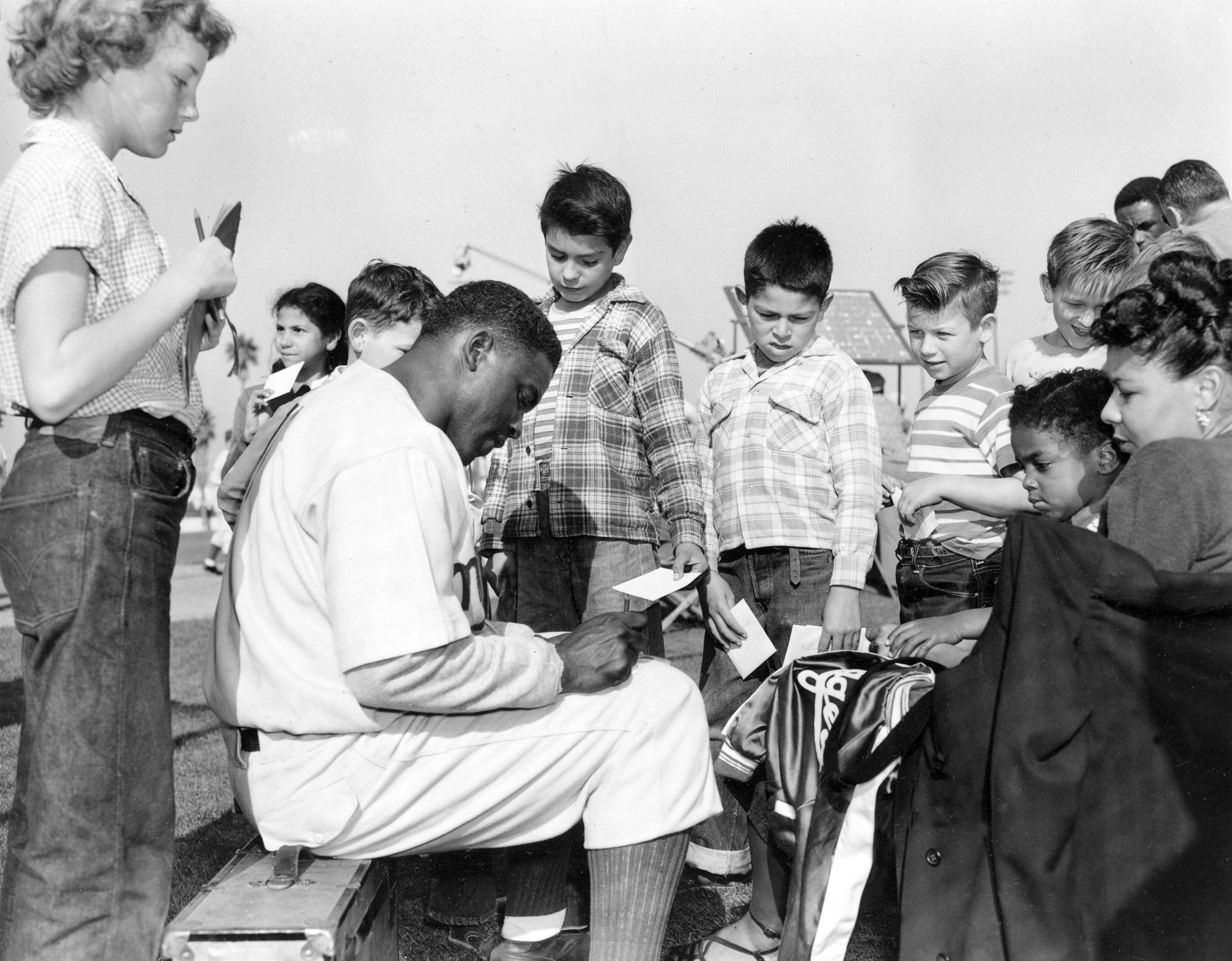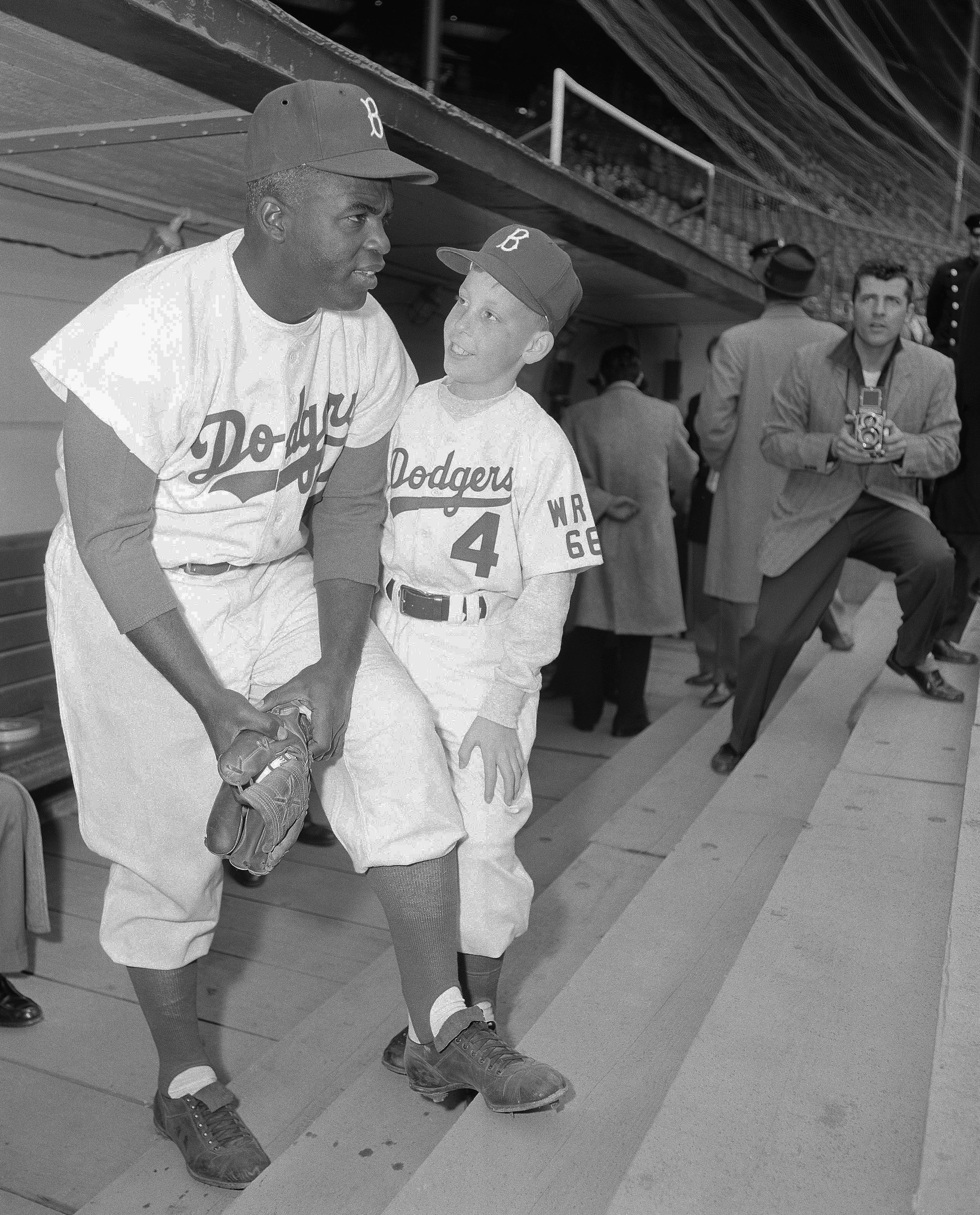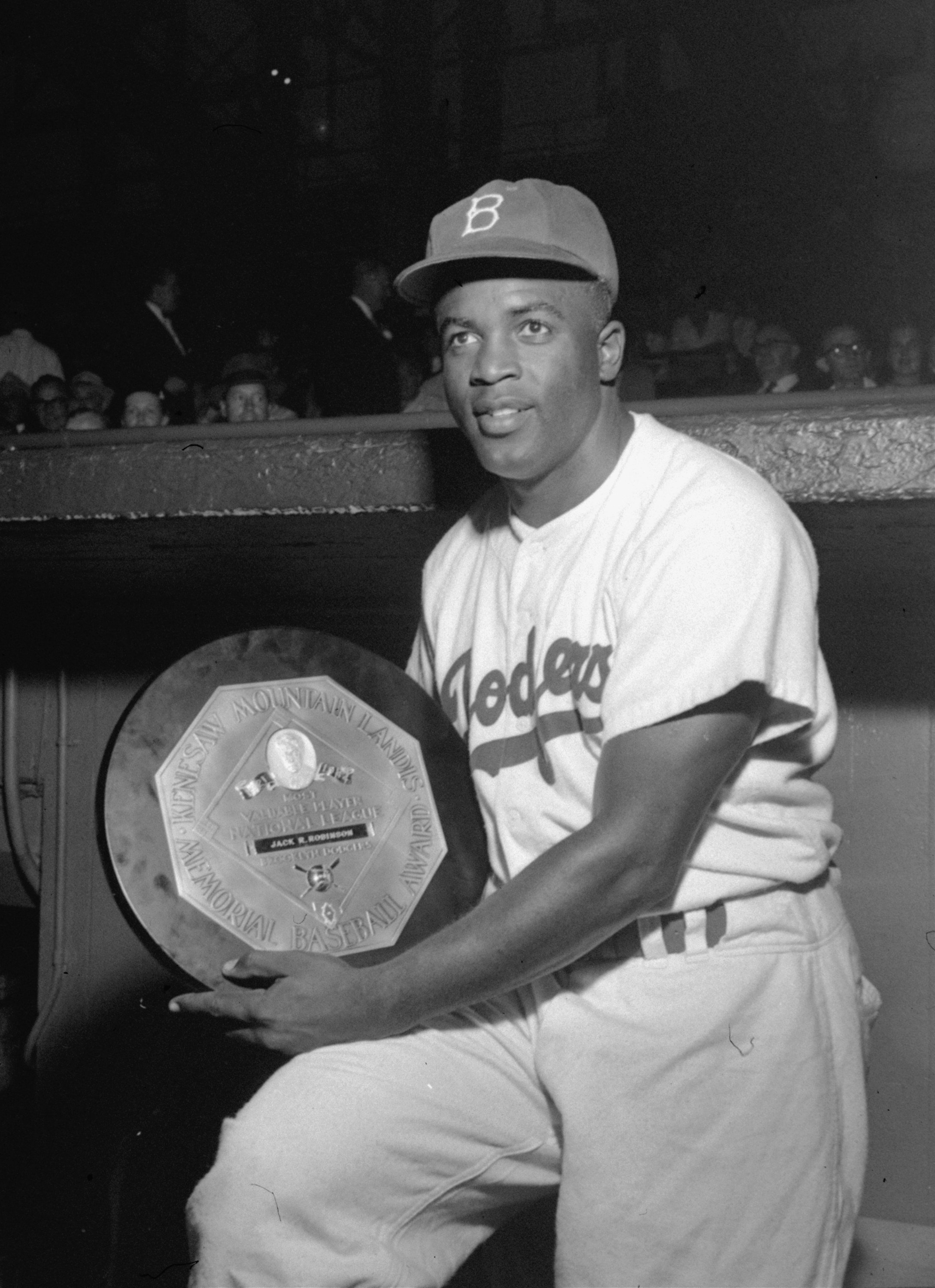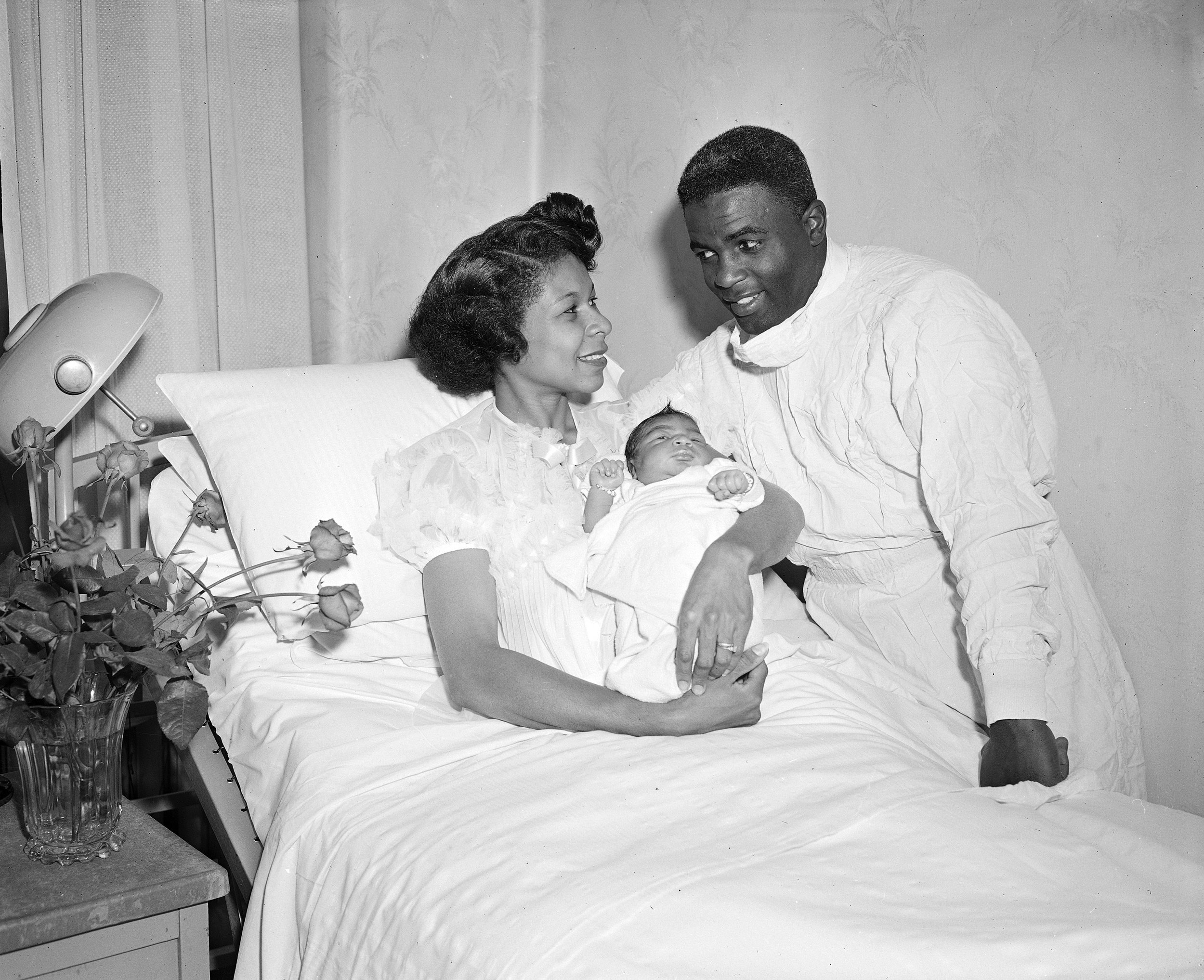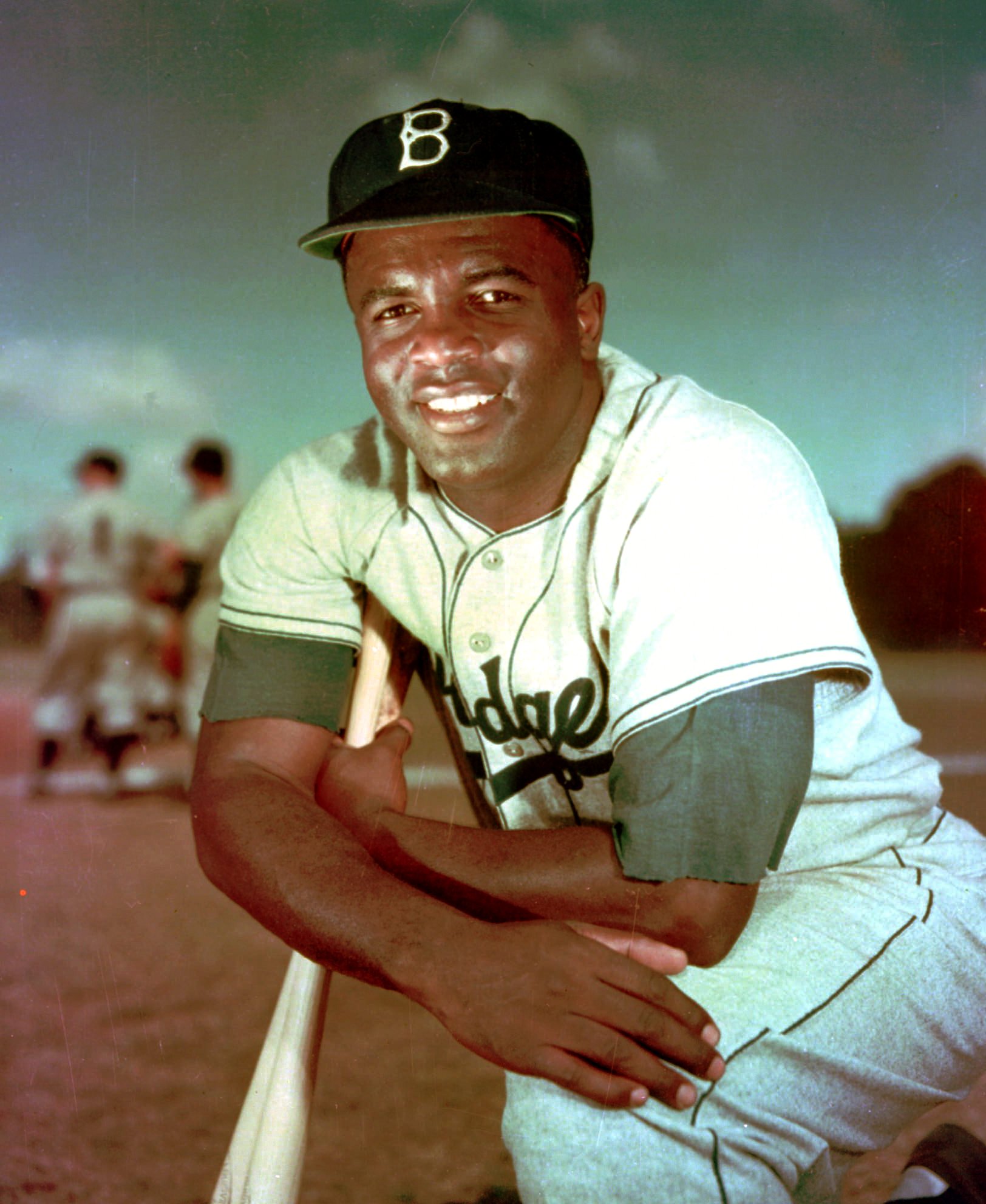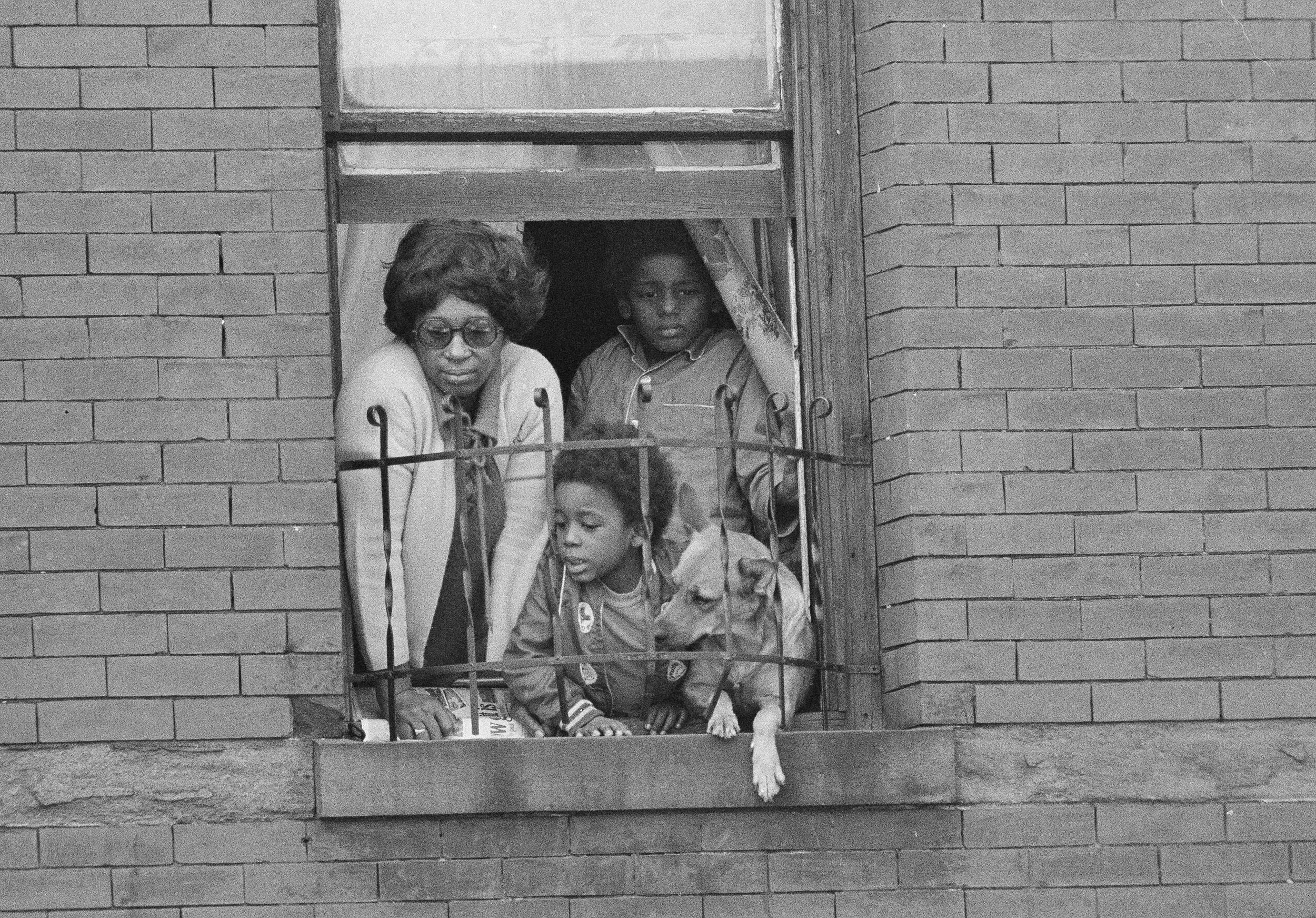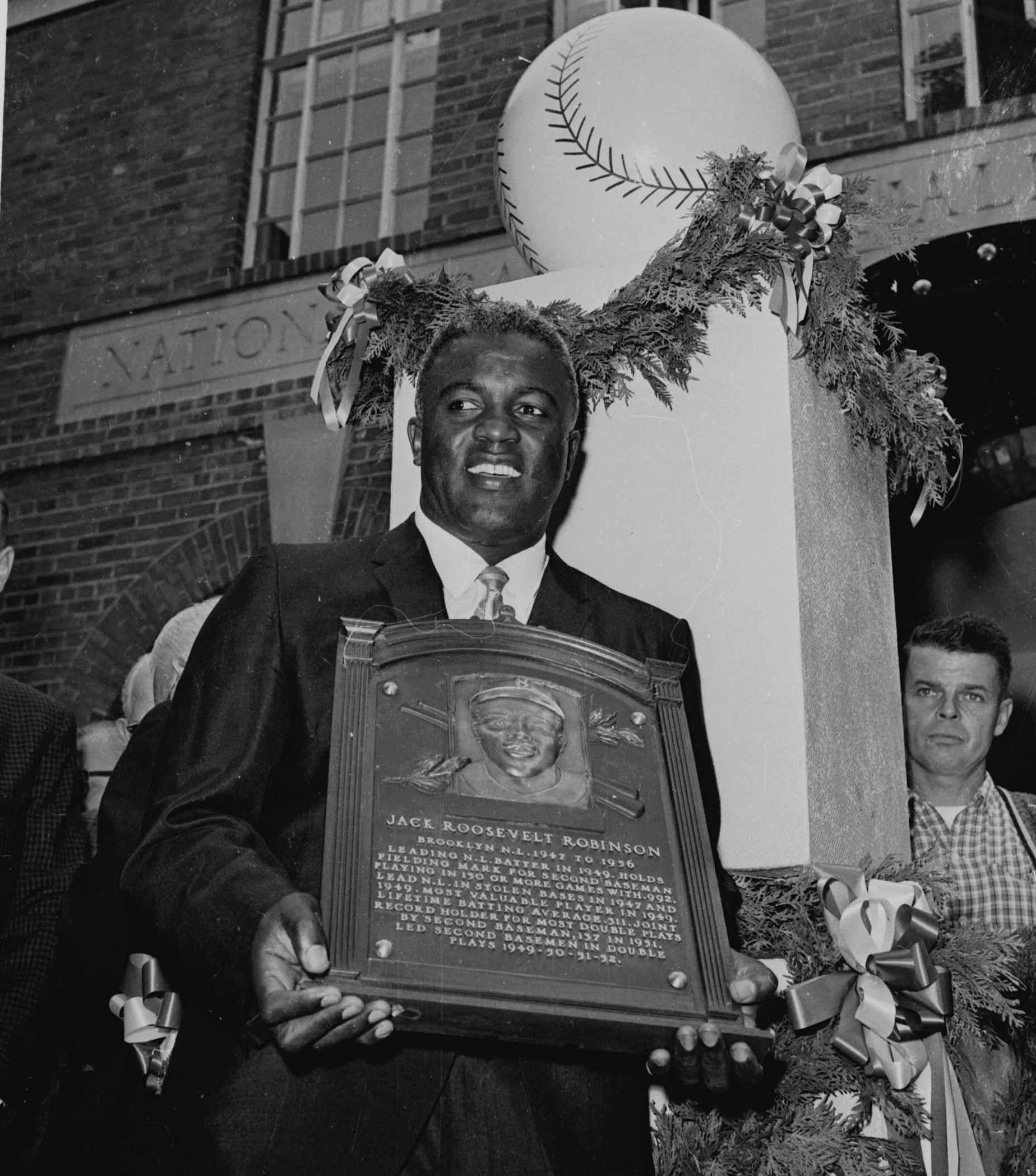Jackie Robinson (1919-1972) - Baseball Legend and Civil Rights Advocate

Baseball legend Jackie Robinson died 50 years ago, on Oct. 24, 1972. The first Black player to be signed to the major leagues, Robinson was a force both on and off the field. He was selected by Branch Rickey, president and general manager of the Brooklyn Dodgers, who set out to integrate major league baseball.
Scouting the Negro Leagues for talent, Rickey found in Robinson the man to break the color barrier in baseball. Robinson was a UCLA star in football, baseball, basketball and track, he served in World War II and was a standout player with the Kansas City Monarchs, a team in the Negro Leagues. Robinson signed with the Montreal Royals on October 23, 1945. On April 10, 1947 his contract was purchased by the Brooklyn Dodgers. In his 10 seasons with the Dodgers, Robinson batted .311, winning the 1947 Rookie of the Year Award and the 1949 National League MVP. In 1956 Robinson became the first Black player to be elected to the Baseball Hall of Fame.
Subjected to an inordinate amount of abuse by opposing players and fans, Robinson maintained his faith in humanity, but didn’t shy away from a righteous fight. In his autobiography, “I Never Had it Made,” published shortly after his death, Robinson wrote: “I cannot stand and sing the anthem. I cannot salute the flag; I know that I am a black man in a white world. In 1972, in 1947, at my birth in 1919, I know that I never had it made.” He responded after retirement by joining the struggle to further the cause of racial equality.
On June 4, 1972, the Dodgers retired Robinson's uniform number, 42. On April 15, 1997, No. 42 was retired from Major League Baseball, a singular honor. Since 2004, every MLB player can don Number 42 on April 15th, Jackie Robinson Day, to celebrate the man and his legacy.
Jackie Robinson, a four sport great for UCLA from 1939-1941 in football, baseball, basketball and track and field poses in his basketball uniform in this undated photo. Robinson is a native of Pasadena, California. (AP Photo)
This Sept. 20, 1939, file photo shows Jackie Robinson during football training at the University of California campus in Westwood, Calif. Robinson lettered in football, basketball, baseball and track and field in college. (AP Photo)
Montreal, Oct. 23 (AP) - The first Negro player ever to be admitted to organized baseball was signed tonight by the Brooklyn Dodgers for their International League farm club, the Montreal Royals.
Jackie Robinson, one-time UCLA halfback ace and recent shortstop of the Kansas City Negro Monarchs, put his signature on a contract calling not only for a regular player’s salary, but also for a bonus signing.
Product of a three-year search and $25,000 for Negro diamond talent by Dodger President Branch Rickey, Robinson signed up in a history-making huddle with Hector racine and Lt. Col. Romeo Gavreau, Royals’ president and vice president, respectively, and Branch Rickey Jr., who heads the Brooklyn farm system.
"Mr. Racine and my father,” said young Rickey in making the surprise announcement, “undoubtedly will be severely criticized in some sections of the United States where racial prejudice is rampant. They are not inviting trouble, but they won’t avoid it if it comes. Jack Robinson is a fine type of young man, intelligent and college bred, and I think he can take it too.”
(Excerpt from AP news story, October 23, 1945)
Montreal Royals Jackie Robinson poses on April 18, 1946. Robinson broke the color barrier and changed baseball forever. (AP Photo/John J. Lent)
Jackie Robinson, first Black player in the major leagues, signs with the Montreal Royals in Montreal October 23, 1945. From left are: Royals president Hector Racine, Branch Rickey Jr., Robinson and Royals vice-president Romeo Gauvreau. (AP Photo)
Excerpt from AP Jackie Robinson obituary by Hubert Mizzel, October 24, 1972.
Jackie Robinson, first baseman of the Brooklyn Dodgers, returns an autograph book to a fan in the stands, during the Dodgers' spring training in Ciudad Trujillo, now Santo Domingo, in the Dominican Republic, on March 6, 1948. (AP Photo)
Jackie Robinson, signed by the Brooklyn Dodgers and assigned to the Montreal Club, holds hands with his bride, the former Rachel Isum in Los Angeles, Feb. 26, 1946. The couple disclosed in Los Angeles that they were married Feb. 10, 1946. (AP Photo/Ed Widdis)
Third baseman Joh Jorgensen (left), purchased by the Brooklyn Dodgers from the Montreal Royals of the International League, joined the Dodgers April 15, 1947, in time to start at third base in the season's opener against Boston. The Dodger infield (left to right) comprises Jorgensen, shortstop Pee Wee Reese, second baseman Ed Stanky, and first baseman Jackie Robinson, all of whom played in the opener at Ebbets Field, Brooklyn. (AP Photo/Harry Harris)
Brooklyn Dodgers' president Branch Rickey, right, and the team's star rookie Jackie Robinson, confer at the Chicago Baseball Writers' Association annual dinner in Chicago, Ill., Jan. 18, 1948. (AP Photo)
In this photo sequence, Dick Sisler, Philadelphia Phillies left fielder, is forced at second, but his slide breaks up a potential double play in 4th inning of game with Brooklyn Dodgers at Ebbets Field, Brooklyn, Oct. 1, 1950. During the slide, Dodgers second baseman Jackie Robinson is knocked off his feet and yet relays to first to catch Phillies right fielder Del Ennis, who grounded to dodgers Billy Cox at third. Phils won 4-1, to clinch the National League pennant. (AP Photo)
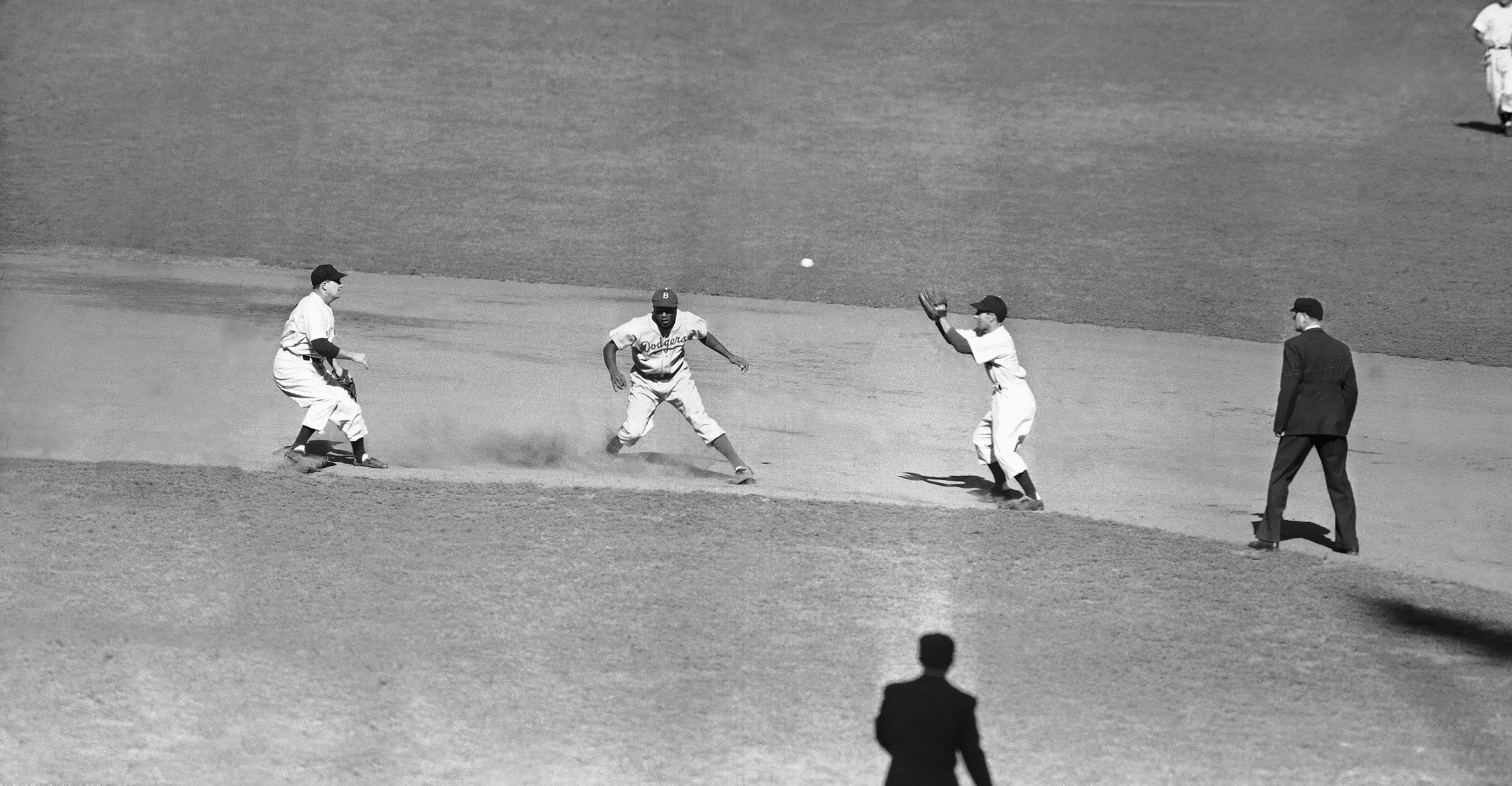
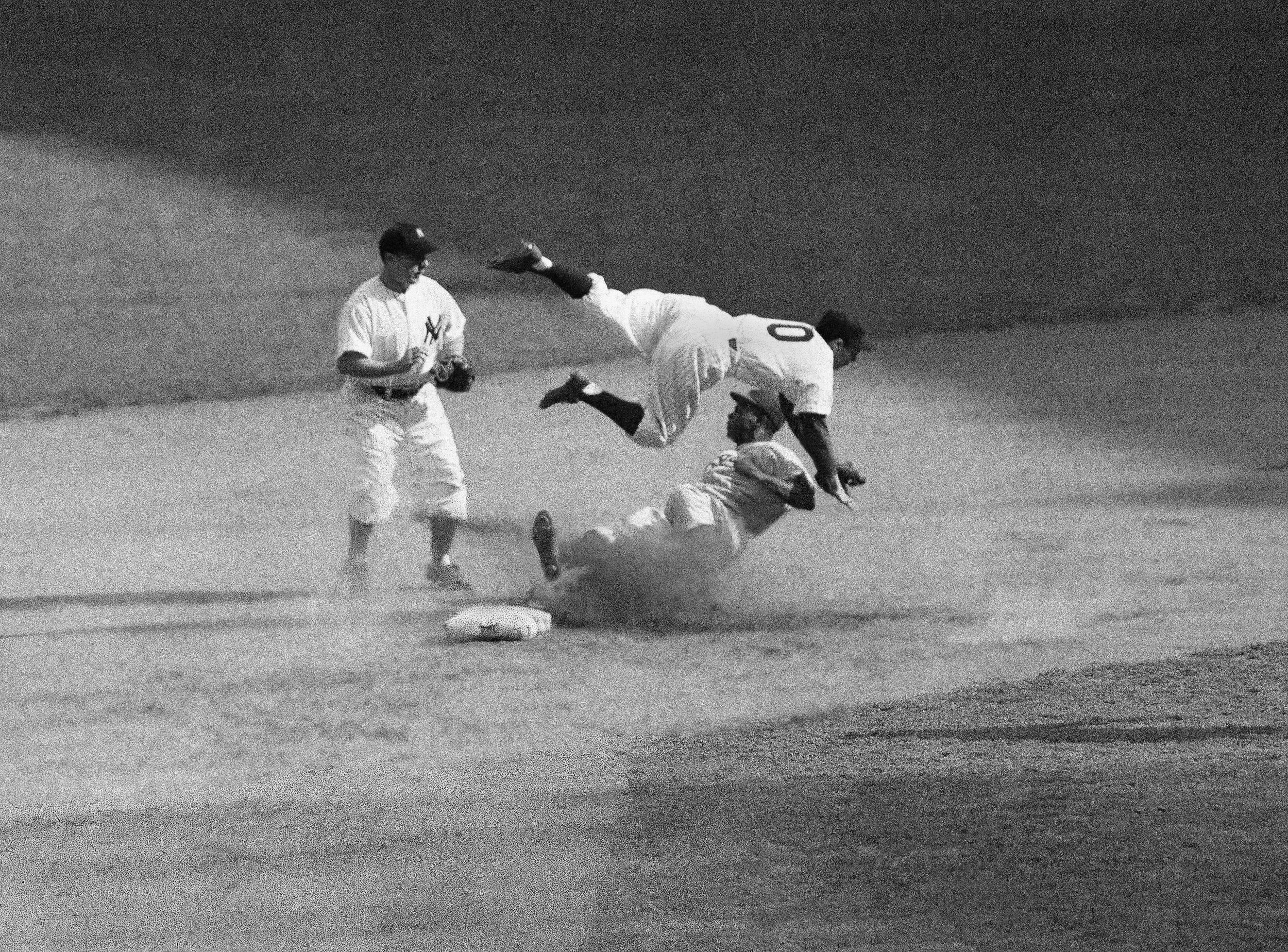
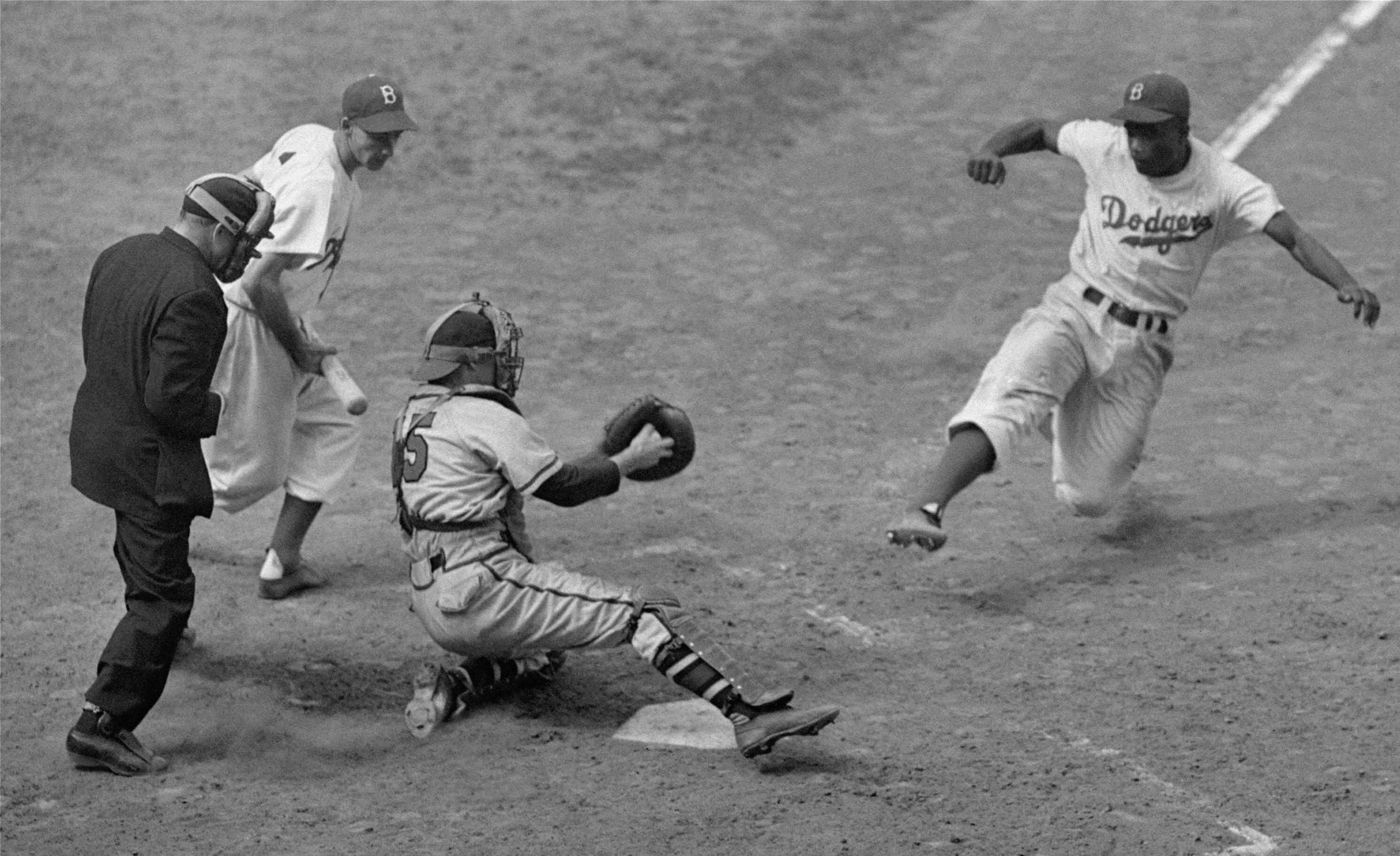
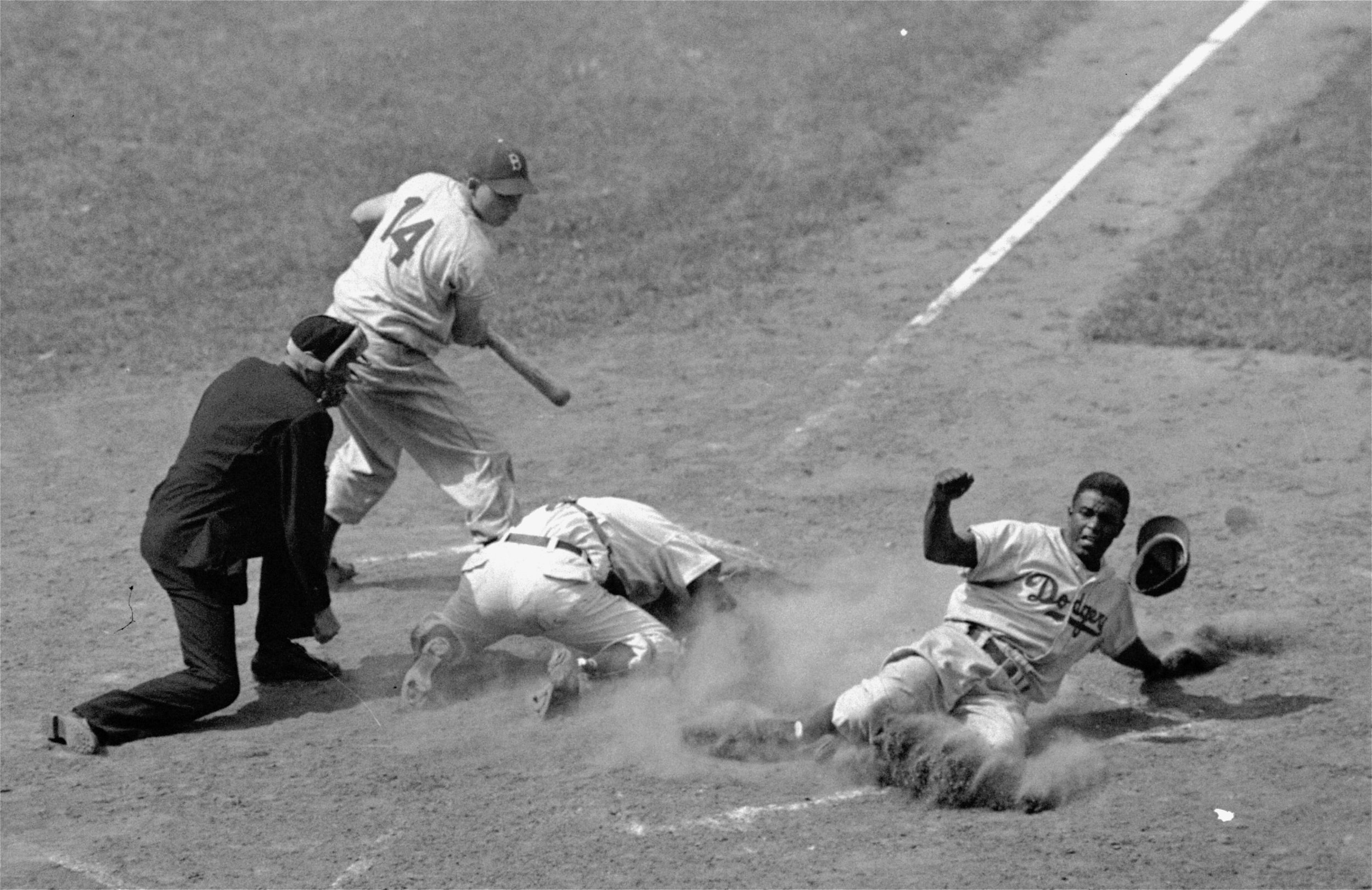
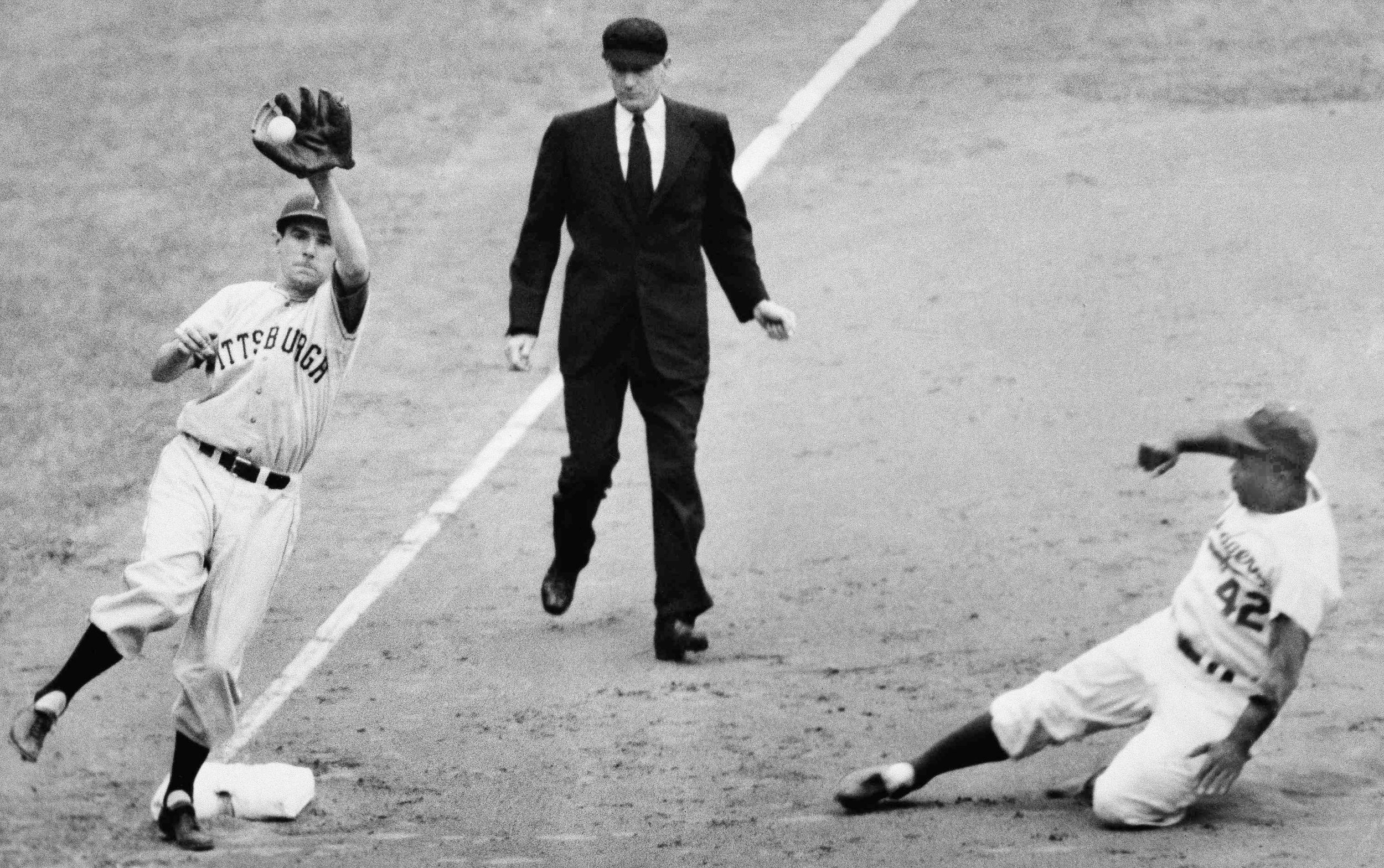
With his wife Rachel and his son looking on at right, Brooklyn Dodgers' first baseman Jackie Robinson signs autographs for his young fans, in Anaheim, Calif., on February 20, 1950. (AP Photo)
Ten-year-old Allen Simkowitz, of Newark, N.J., is all smiles as he talks with Jackie Robinson of the Brooklyn Dodgers on April 19, 1956 at Roosevelt stadium, Jersey City, New Jersey, before the game with Philadelphia Philles. This was one of many thrills experienced by Allen as he served as batboy for the day is national league debut by the Dodgers at the Jersey City ball park. (AP Photo/RW)
Members of the Brooklyn Dodgers gather around a snowman on the diamond at Ebbets Field in Brooklyn, New York, April 14, 1950 after a freakish mid-spring snowfall caused the cancellation of their game with the New York Yankees. It was the first game scheduled in New York for the teams that have just arrived from spring training in the south. From left to right are: Roy Campanella, catcher; Peewee Reese, shortstop; Gil Hodges, first baseman, and Jackie Robinson, second baseman. (AP Photo/Anthony Camerano)
Jackie Robinson, star second baseman for the Brooklyn Dodgers, voted the most valuable player in the National League last season, holds the Kenesaw Mountain Landis Memorial Baseball award presented to him by Ford Frick, president of the National League, before the start of a night game between the Dodgers and the Boston Braves at Ebbets Field in Brooklyn on July 6, 1950. (AP Photo/Marty Lederhandler)
Brooklyn Dodgers' second baseman Jackie Robinson poses on May 17, 1952. (AP Photo )
Baseball legend Jackie Robinson looks at this wife Rachel as she holds their second son, David, at Flower Fifth Avenue Hospital in New York, May 15, 1952. The baby was born yesterday. The Robinsons also have a daughter, Sharon, and a son, Jackie Jr. (AP Photo/John Rooney)
Brooklyn Dodger second baseman Jackie Robinson, whose wife gave birth to a boy May 14, passes out the cigars to his teammates in dressing room on May 15, 1952 at Ebbets Field, Brooklyn, New York, before night game against Pittsburgh. Left to right are Preacher Roe, Robinson, Pee Wee Reese and Duke Snider. Gil Hodges is seated. The Robinsons now have two sons and daughter. (AP Photo/JJL)
African American athletes Jackie Robinson, left, and Floyd Patterson,right, are welcomed to Birmingham, Ala. May 13, 1963 by Intergration leader Wyatt Tee Walker, center, and a sign overhead. They came here to address an integration rally. (AP Photo)
Boxer Floyd Patterson, left, and former baseball player Jackie Robinson, right, discuss Birmingham race relations with civil rights leaders, Rev. Ralph D. Abernathy, second from left, and Rev. Martin Luther King, Jr., in Birmingham, Ala., May 14, 1963. The athletes addressed gatherings at two churches in the area last night. Man at far left is unidentified. (AP Photo)
Former baseball star Jackie Robinson carries a placard as he joins pickets at the construction site of the Down State Medical Center in Brooklyn, New York City, August 2, 1963. Robinson and members of CORE, the Congress of Racial Equality, have been demonstrating in an effort to stop construction of publicly financed projects until more jobs are given to Blacks. (AP Photo)
Jackie Robinson, former Brooklyn Dodgers baseball player, hits a punching bag held by heavyweight boxing champion Cassius Clay in a New York gym during his visit on March 13, 1963. (AP Photo)
Baseball legend Jackie Robinson, with his arm around his wife Rachel, are seen outside Antioch Baptist Church in the Brooklyn section of New York following funeral services for their son Jackie Robinson, Jr., June 21, 1971. Jackie Jr. died in a car accident June 17 in Norwalk, Ct. Others in photo are, from left: daughter Sharon Robinson, being embraced by an unidentified family friend. (AP Photo/Marty Lederhandler)
Jackie Robinson, infielder for the Brooklyn Dodgers, poses in May of 1952. (AP Photo/Dan Grossi)
Some of Jackie Robinson's former Brooklyn Dodger teammates carry his casket from Riverside Church in New York, Oct. 27, 1972, following funeral services. Pallbearers include: Bill Russell, left, former Boston Celtics basketball star; behind him, ex-Dodger pitcher Ralph Branca; former Dodger pitcher Don Newcombe at right. In line at left are: former Dodger catcher Roy Campanella, in wheelchair; Chicago Cubs coach Ernie Banks, fourth from left; and Elston Howard, fifth from left, ex-Yankee catcher. In foreground with white hair is civil rights leader Bayard Rustin. (AP Photo)
A mother and her two children view the scene somberly from their 125th Street apartment window in New York's Harlem, Oct. 27, 1972, as baseball legend Jackie Robinson's funeral cortege moves through the area following services at Riverside Church. The cortege was headed for Cypress Hills Cemetery in Brooklyn by way of Harlem and Bedford Stuyvesant, the city's two largest Black neighborhoods. (AP Photo/Dave Pickoff)
David Robinson, third from left, and Dr. Jesse Jackson, fourth from left, join other family members, and friends in paying final respects to baseball star Jackie Robinson, in a Brooklyn cemetary, in New York, Oct. 27, 1972. (AP Photo)
Jackie Robinson poses with the plaque presented to him during induction ceremonies at the Baseball Hall of Fame in Cooperstown, N.Y. July 23, 1962. A series of initiatives will be announced in New York Wednesday Feb. 26, 1997 to celebrate the 50th anniversary of Jackie Robinson's entry into the major leagues and the barrier-breaking spirit that guided Robinson throughout he life as an athlete, businessman and social activist. (AP Photo)
NEW YORK (AP) — Long dreamed about and in development for longer than the big league career of the man it honors, the Jackie Robinson Museum opened Tuesday in Manhattan with a gala ceremony attended by the widow of the barrier-breaking ballplayer and two of his children.
Rachel Robinson, who turned 100 on July 19, watched the half-hour outdoor celebration from a wheelchair in the 80-degree Fahrenheit (27-degree Celsius) heat, then cut a ribbon to cap a project launched in 2008.
Her 72-year-old daughter, Sharon, also looked on from a wheelchair and 70-year-old son David spoke to the crowd of about 200 sitting on folding chairs arrayed in a closed-off section of Varick Street, a major thoroughfare where the 19,380-square-foot museum is located. It opens to the public on Sept. 5
“The issues in baseball, the issues that Jackie Robinson challenged in 1947, they’re still with us,” David Robinson said. “The signs of white only have been taken down, but the complexity of equal opportunity still exists.”….“He was a man who used the word ‘we,’” David said. “I think today Jackie Robinson would say I accept this honor, but I accept this honor on behalf of something far beyond my individual self, far beyond my family, far beyond even my race. Jackie Robinson would say don’t think of you standing on my shoulders, I think of myself as standing on the shoulders of my mother, who was a sharecropper in Georgia, my grandmother, who was born a slave.”
(Excerpt from an AP story by Ronald Blum, July 27, 2022)
Major League Baseball Commissioner Robert D. Manfred, Jr., left, poses with Rachel Robinson, widow of Jackie Robinson, during a ceremonial ground breaking for the Jackie Robinson Museum, Thursday, April 27, 2017, in New York. (AP Photo/Mary Altaffer)
An exhibit is shown at the Jackie Robinson Museum, Tuesday, July 26, 2022, in New York. (AP Photo/Julia Nikhinson)
“I believe in the goodness of a free society. And I believe that society can remain good only as long as we are willing to fight for it--and to fight against whatever imperfections may exist.” (Jackie Robinson in a 1952 essay recorded for Edward R. Murrow's radio series This I Believe)
A man is framed by a giant poster of Jackie Robinson as he watches the ceremonial ground breaking for the Jackie Robinson Museum, Thursday, April 27, 2017, in New York. (AP Photo/Mary Altaffer)
Text and photo editing by Francesca Pitaro.


